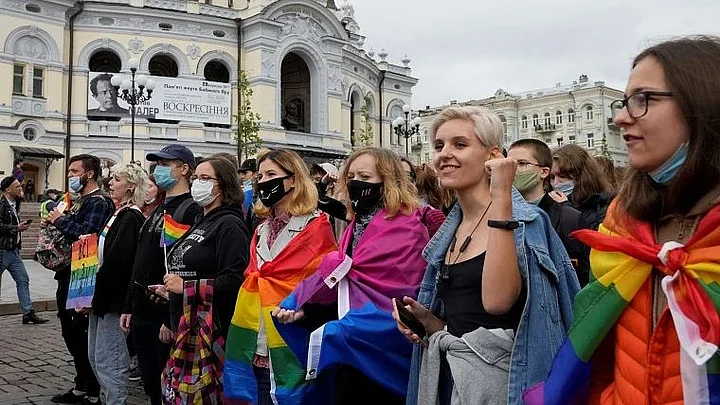For Ukrainian LGBTQ+ rights activists, a Russian victory is an existential threat to both the sovereignty of Ukraine and the rights of LGBTQ+ people.
In his 24 February speech, President Vladimir Putin used LGBTQ+ rights as a justification for his military operation, arguing that the West sought to destroy Russian “traditional values” with their “false values.”
For some LGBTQ+ Ukrainians, the war is a call to arms – both in support of their homeland and in support of their rights. For others, the threat of persecution is prompting them to flee.
But because of the powers conferred by martial law, some LGBTQ+ refugees have been pushed back at the border while others are taking dangerous routes out.
The imperative for LGBTQ+ people to fight is also reflected in the advocacy of LGBTQ+ rights groups like Kyiv Pride, Ukraine Pride, and LGBTIQ Military.
They have positioned LGBTQ+ participation in the military as fundamental to Ukraine’s survival.
Posts on Instagram introduce audiences to the gay Ukrainian men fighting for their country, while photos show drag artists donning military attire with the caption “Ukrainian drag queens destroy Moscovian [sic] occupiers!.”
But for LGBTQ+ Ukrainians who have fled, these posts and messaging can bring feelings of shame.
LGBTQ+ Rights on the Frontline
A narrative is emerging in western media that frames the war as a battle for LGBTQ+ rights against a backward, conservative, and intolerant Russia. And it’s influencing the politics of the European Union.
The European Commission has long criticised Hungary and Poland over their stance on LGBTQ+ rights. In April 2022, it launched disciplinary proceedings against Hungary – which would cut off EU funding – because the country’s anti-LGBTQ+ laws were violating the rule of law. There’s also growing pressure in the EU Parliament to enact similar steps against Poland.
These instances suggest the EU is becoming more robust in its defence of “European values” by standing up to member states that backslide on the democratic standards of the EU.
Similarly, LGBTQ+ activists we spoke to in Poland described how the war presents opportunities to change hearts and minds in the country. Poland’s President Andrzej Duda won re-election in June 2020 campaigning against “LGBTQ+ ideology.”
For LGBTQ+ activists, the parallels between Duda and Putin may be pivotal in their own advocacy efforts – especially if being pro-LGBTQ+ equals being anti-Russian.
One LGBTQ+ activist we spoke with said there is now renewed hope, “Poland is perceived as homophobic but there are lots of beautiful people working on this. Things can change.”
Militarising the Struggle for LGBTQ+ Rights
The frequency with which LGBTQ+ rights are currently being positioned as a key battleground is problematic. While we are seeing transformation in the LGBTQ+ rights landscape in Europe, and some activists feel a renewed sense of hope, literature on LGBTQ+ rights, migration, and conflict offer some stark warnings.
In Queer Wars, the authors draw attention to the increasing geopolitical polarisation over LGBTQ+ rights.
Political leaders, such as those in Russia, Hungary and Poland, have used anti-LGBTQ+ stances and policies to position themselves as defenders of traditional values against western degeneracy.
For Russia, once again, this was used as a justification for the war in Ukraine.
But as international relations scholar Cai Wilkinson notes, linking LGBTQ+ rights with the rhetoric of war risks oversimplifying the stakes of queer liberation by replacing a complex view of specific, contextual struggles for rights with monolithic narratives of winners and losers.
For example, borrowing from philosopher and queer theorist Jasbir Puar’s concept of “homonationalism,” there is a risk that the struggle for LGBTQ+ rights is simplified into a straightforward narrative of European or western values versus the intolerance of the East or “the rest.”
In the years following the so-called European refugee crisis, this rhetoric was used to justify hard borders and the framing of refugees as a threat to European values of liberalism and tolerance, underscored by intense Islamophobia.
In 2017, German politician Jens Spahn argued that the moral values of refugees differ significantly to those of Germans, citing homophobia and transphobia as examples. Similar rhetoric has been used by the politicians in the United States, pitting LGBTQ+ rights against Muslims, the threat of foreign regimes and terrorism.
In 2021, Ursula von der Leyen, president of the European Commission, tweeted that the EU is an #LGBTIQFreedomZone in response to the introduction of “LGBTQ+ free zones” in approximately 100 Polish municipalities. However, despite such a declaration, LGBTQ+ rights in Europe remain precarious and many are barred from entering Fortress Europe.
Implications for Ukraine
While the war in Ukraine appears to be emboldening calls for LGBTQ+ rights protections and transforming the advocacy efforts of groups in Ukraine, there are risks that LGBTQ+ rights and liberation could be swallowed by the rhetoric of war or homonationalist narratives.
Despite the promises of freedom and safety, LGBTQ+ refugees from Ukraine face substantial protection gaps in accessing services and support – particularly if they are people of colour, or not Ukrainian passport holders.
While it is tempting to view the war in Ukraine as a metaphor for some larger struggle between a tolerant West and an intolerant East, the reality is inevitably far more complex. It is worth interrogating these narratives in order to understand the realities facing LGBTQ+ people.
(This is an opinion piece and the views expressed above are the author’s own. The Quint neither endorses nor is responsible for the same. This article was originally published on The Conversation. Read the original article here.)
